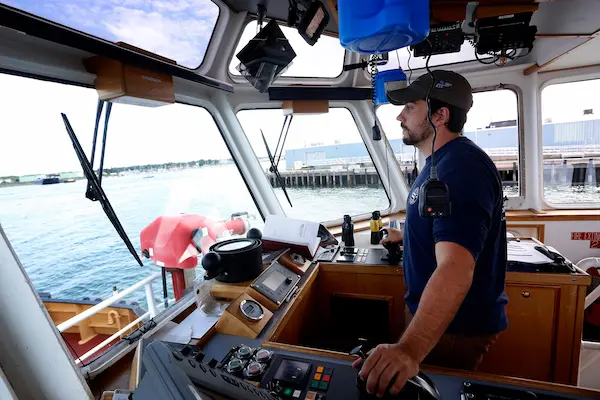The allure of a career at sea is undeniable – the vast expanse of the ocean, the thrill of navigating international waters, and the satisfaction of a job vital to global trade. But for many, the question lingers: can a maritime career offer financial security alongside adventure? The answer is a resounding yes. The marine transportation industry boasts a wealth of opportunities with excellent earning potential.
This comprehensive guide dives into the top 15 highest-paying jobs in marine transportation, exploring the roles, salaries, education requirements, and projected growth for each. So, whether you’re a seasoned sailor seeking a new challenge or a landlubber with a yearning for the sea, this list will equip you with the knowledge to chart your course toward a rewarding career.
1. Marine Service Department Manager: The Stewards of the Fleet (Median Salary: $62,000)
Imagine yourself as the guardian of a multi-million dollar vessel, responsible for its upkeep, repairs, and overall seaworthiness. Marine service department managers wear many hats. They oversee a team of technicians, meticulously inspecting vessels during port calls to ensure everything is in shape.
Their days are filled with problem-solving, ensuring vessels meet rigorous safety standards and operate at peak performance. This role typically requires a high school diploma, with technical knowledge and experience in marine mechanics being valuable assets.
2. Radio Tech: Keeping the Lines of Communication Open (Median Salary: $71,000)
In the dynamic world of marine transportation, seamless communication is paramount. Radio technicians are the unsung heroes who keep the information flowing. Their duties involve designing, installing, operating, and maintaining radio communication systems and a variety of radio programs onboard vessels.
They troubleshoot technical glitches, ensuring radio equipment functions optimally, and play a crucial role in emergencies. A bachelor’s degree is generally preferred for this role, with strong technical aptitude and a keen interest in electronics being essential.
3. Marine Surveyor: Ensuring Safety on the High Seas (Median Salary: $84,500)
Marine surveyors act as the watchful eyes on behalf of shipping companies, insurance providers, and regulatory bodies. Their meticulous inspections encompass all aspects of a vessel, from its hull and machinery to cargo loading and unloading procedures.
They verify that vessels comply with safety regulations and are seaworthy. This critical role requires a bachelor’s degree, often in marine or nautical science, with a strong understanding of maritime regulations and surveying procedures.
4. Shipbuilding Engineer: Architects of the Ocean (Median Salary: $78,000)
The masterminds behind the colossal ships that dominate the seas are shipbuilding engineers. They work in collaboration with teams of engineers to design and construct these marvels of modern transportation.

As technology evolves at an ever-increasing pace, shipbuilding engineering offers a dynamic and intellectually stimulating career path. A four-year engineering degree is a prerequisite, and most companies favor candidates with practical experience in the shipbuilding industry.
5. Marine Technician: The Hands-On Healers of the Sea (Median Salary: $51,000)
Keeping these oceangoing workhorses operational is no small feat. Marine technicians are the frontline responders when it comes to repairs, upgrades, and routine maintenance of a vessel’s electrical and plumbing systems.
They may work onboard ships in shifts, addressing maintenance needs as they arise, or work in shipyards tackling more extensive repairs. A high school diploma is sufficient for entry-level positions, with on-the-job training and certifications enhancing career prospects.
6. Marine Welder: Masters of Metal and Mayhem (Median Salary: $80,000)
Welding is a challenging profession, and marine welding takes it to a whole new level. Imagine welding on a rocking ship in the throes of a storm – that’s the world of a marine welder. Their expertise lies in welding traditionally and under demanding maritime conditions.
Some welders even specialize in underwater welding on ships and offshore equipment, commanding the highest salaries in the welding trade. While a high school diploma is sufficient for entry-level positions, certifications in scuba diving can significantly boost earning potential.
7. Marine Painter: More Than Just a Coat of Paint (Median Salary: $45,000)
Don’t underestimate the importance of a marine painter. While the job description might seem straightforward, the reality is far more nuanced. Marine paint protects vessels from the harsh elements, particularly saltwater, which can cause devastating corrosion.
These professionals are highly skilled in using specialized paints, application techniques, and preparatory materials to ensure vessels are properly protected. A high school diploma is typically required, with training programs offered by paint manufacturers or unions.

